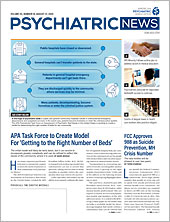The field of digital mental health reached a milestone this past June when the Food and Drug Administration (FDA) permitted the marketing of EndeavorRx—a prescription-based video game developed by Akili Interactive to treat attention symptoms in children with attention-deficit/hyperactivity disorder (ADHD).
The marketing clearance culminates a nearly decade-long clinical research program by Akili that began with basic neuroscience studies exploring game-based cognitive tasks to improve attention in older adults.
“We’re proud to make history with the FDA’s decision,” said Akili CEO Eddie Martucci, Ph.D., in a press release. “With EndeavorRx, we’re using technology to help treat a condition in an entirely new way as we directly target neurological function through medicine that feels like entertainment.”
On the surface, EndeavorRx appears similar to countless other action games available on phones and tablets; the player maneuvers an airship through various levels while avoiding obstacles and collecting tokens. The difference is under the hood, as the coordinated hand-eye movements required stimulate a specific neural pathway involved in attention. The game adapts based on the user’s progress, so that children are always playing at the cusp of their skill level to provide maximum neural training.
The game is intended to be played for about 25 minutes a day (though not necessarily in one session) for five days a week. After 30 minutes of play each day, children are locked out of the game to ensure proper treatment adherence. Parents can use a related behavior tracking app to monitor changes in their children’s symptoms.
The FDA cleared EndeavorRx based on data from five clinical studies involving more than 600 children with ADHD. The largest of these was a randomized trial of 348 children aged 8 to 12 years who were instructed to play EndeavorRx or an educational puzzle game for 25 minutes daily for four weeks. In the trial, called STARS, the researchers evaluated the children using an objective scale known as the Test of Variables of Attention (TOVA) before and after this four-week period. TOVA is a 20-minute computerized test that assesses cognitive traits such as response time and frequency of attentional lapses. After four weeks, 47% of children playing EndeavorRx showed significant improvement in their TOVA scores, compared with 32% of children doing the puzzle game.
No children in the randomized study were taking medication, but a second open-label study with EndeavorRx found that the software was equally effective in children who were taking stimulants. This suggests EndeavorRx can be a standalone therapy or an adjunct to medication. “This is an important moment in ADHD therapy, but we need to manage our expectations moving forward,” said Ann Childress, M.D., president of the Center for Psychiatry and Behavioral Medicine in Las Vegas and an investigator on two of Akili’s clinical studies.
“This game is not for everybody. We have to understand it is not intended to reduce hyperactivity, and even the impact on attention will be subtle,” continued Childress.
Childress stressed that although EndeavorRx is presented as a game, the adaptive program keeps it challenging. “Children who tend to get frustrated easily when gaming would not be good candidates,” she said.
For some children, however, this game can be a valuable component of a comprehensive treatment program, she continued.
Michelle Colder Carras, Ph.D., an associate researcher at the Johns Hopkins School of Public Health who studies the intersection of video games and mental health, agreed that the FDA clearance was groundbreaking. As with other novel digital tools, EndeavorRx was cleared through the De Novo premarket review pathway, a regulatory pathway for new low- to moderate-risk devices. With the clearance, other companies now have a framework as to what is expected with therapeutic games.
Still, Colder Carras, who is not involved with Akili Interactive, cautioned that FDA benchmarks for marketing purposes are different from those doctors and parents might consider clinically important. Improvements in TOVA scores are well and good, “but will this game really make a difference in how children function with family or friends?”
Participants in the STARS trial who played EndeavorRx did not show significant differences from the others in other ADHD scales often used by physicians, such as the ADHD Rating Scale or the Clinical Global Impressions scale.
Colder Carras also expressed skepticism over whether Akili’s video game can provide sustained engagement outside of a clinical trial setting. The mechanics are wrapped in a gamelike experience, she noted, but EndeavorRx is a repetitive cognitive task first and foremost. “We do not have a lot of evidence showing cognitive games provide long-term benefits or generalize to skills outside of the game.”
As the medical game field matures, Colder Carras said that developers will recognize the need for complex and engaging game design. “My hope is that an intervention can be developed with the same attention to environment, features, and mechanics as a commercial video game—one that is able to demonstrate therapeutic benefits and sustain engagement long enough to have a real-world impact.” ■
More information on the ADHD-STARS study is posted
here.

